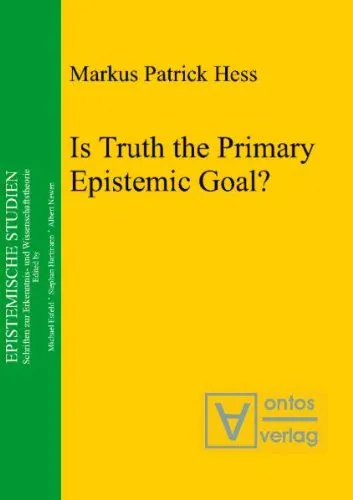Is Truth the Primary Epistemic Goal? (Epistemische Studien)
4.6
Reviews from our users

You Can Ask your questions from this book's AI after Login
Each download or ask from book AI costs 2 points. To earn more free points, please visit the Points Guide Page and complete some valuable actions.Introduction
The pursuit of knowledge has long been intertwined with the quest for the truth. But is truth truly the primary epistemic goal that drives our understanding of the world? This question forms the crux of 'Is Truth the Primary Epistemic Goal', a timely exploration into the philosophy of knowledge and the value systems that underpin our epistemic endeavors. In this book, we delve deep into the theories and arguments that scrutinize the role of truth, bringing forth a nuanced perspective on the dynamics between truth, beliefs, and understanding.
Detailed Summary
In 'Is Truth the Primary Epistemic Goal', the discussion begins by setting the groundwork on what it means for truth to be an epistemic goal. The work examines traditional philosophical arguments that position truth at the heart of epistemic theory, arguing that without a foundation in truth, other epistemic values might lose their significance.
The book then branches into a critical analysis of various philosophical schools of thought. It questions, probes, and sometimes challenges the conventional assertions about the primacy of truth. Through a series of thought experiments, hypothetical scenarios, and rigorous analyses, readers are encouraged to question how deeply our epistemic pursuits are intertwined with truth.
Furthermore, the book explores alternative epistemic goals such as understanding, rationality, and cognitive success. Each alternative is meticulously evaluated to ascertain whether it can hold its ground as a primary or a subsidiary epistemic aim.
Key Takeaways
One of the key takeaways from the book is the realization that the relationship between truth and our epistemic goals might be more complex than traditionally perceived. Readers are invited to consider the following insights:
- The role of truth as not just a theoretical concept, but a practical guide that shapes real-world decision-making.
- An understanding of alternative epistemic goals that offer complementary insights to truth itself.
- A broader perspective on how human cognition might prioritize or deprioritize truth based on situational contexts.
Famous Quotes from the Book
Within its pages, the book offers several thought-provoking quotations that encapsulate its core ideas. Some noteworthy ones include:
"Truth may be paramount, but the paths to understanding might diverge, inviting broader horizons."
"Our epistemic journeys, while guided by truth, may find fulfillment in diverse, intertwined goals."
Why This Book Matters
Why should we care about whether truth holds the primary position among epistemic goals? This book posits that our comprehension of epistemic objectives can significantly impact various fields, from education to AI development. The clarity we gain from understanding these dynamics influences how we teach critical thinking, how we structure algorithms that define artificial intelligence, and how we make choices that affect societal outcomes.
In an era where information is abundant and often misleading, evaluating the essence and direction of our epistemic pursuits is not just philosophical pondering but a necessity. This book invites readers not only to contemplate profound theoretical questions but to consider their implications in a world where truth is frequently contested.
Free Direct Download
Get Free Access to Download this and other Thousands of Books (Join Now)
For read this book you need PDF Reader Software like Foxit Reader


